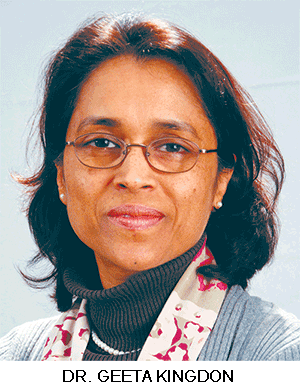 That the public schooling system is tragically broken hardly needs proof — the massive abandonment of government schools (despite their providing free tuition, books, uniform and mid-day meals) and migration to fee-charging schools, even by children of poorest households, is proof enough. The Union HRD ministry’s District Information System on Education (DISE) data show that in the four-year period from 2011-2015, aggregate enrollment in government schools countrywide declined by 11 million and increased in private schools by 16 million.
That the public schooling system is tragically broken hardly needs proof — the massive abandonment of government schools (despite their providing free tuition, books, uniform and mid-day meals) and migration to fee-charging schools, even by children of poorest households, is proof enough. The Union HRD ministry’s District Information System on Education (DISE) data show that in the four-year period from 2011-2015, aggregate enrollment in government schools countrywide declined by 11 million and increased in private schools by 16 million.
What exactly is wrong with government schools? After all, they have trained and well-paid teachers, playgrounds, blackboards, drinking water, toilets, teaching-learning material grants, school development grants, a favourable average teacher-pupil ratio — 40 percent of all government elementary schools (420,000 out of the total 1.04 million schools in the country) have fewer than 50 students and an average of 32 students, which translates into four-six children per class.
Alas, fulfilling the infrastructure, trained-teachers and pupil-teacher-ratio norms prescribed by the Right of Children to Free & Compulsory Education (RTE) Act, 2009 isn’t sufficient (or perhaps even necessary) qualification to be branded a quality school. Whats needed is teachers who attend school, maintain a timetable, go into classes to teach, set homework, assess pupils, provide regular feedback, monitor extra-curricular activities and ensure good learning outcomes. But all this requires effort, and effort is lacking in public schools, as seen from the Union HRD ministry and World Bank surveys of teacher absenteeism and teachers time-on-task. This data indicates high teacher absenteeism of almost 25 percent, and low time expended on teaching tasks. As the PROBE (1998) report found years ago, even when government school teachers are in school, they are engaged in a variety of pastimes such as sipping tea, snacking, reading comics, knitting or just snoozing.
Yet, instead of focusing on effort-deficit, the favoured solution to improve public education has been to allocate greater funding, pay higher salaries, appoint more teachers and give more amenities, all soft-option solutions that permit government to dispense largesse to this influential vote bank. There are scores of lurid examples of this kind of cynical, self-serving, populist and politically expedient policy formulation (e.g. the regularisation of 176,000 unqualified, non-TET-passed para teachers in Uttar Pradesh, a politically motivated decision prior to general election 2014, which caused the salaries of these teachers to increase nine-fold in one go, and which the Supreme Court rescinded in August 2017, sparking riots and some suicides).
Article 171 (3 c) of the Constitution of India gives teachers guaranteed membership of upper houses of state legislatures. As a result, a high proportion of the legislative councils (e.g. upto 24 percent in UP) are constituted by teachers. Moreover, teachers of private but government-aided schools freely contest Lower House elections, with many becoming MLAs. They are not deemed to hold an ‘office of profit despite being government paid employees.
This special constitutional privilege granted to teachers in India, viz, their guaranteed representation, requires carving out separate teacher constituencies for electing members to the Upper House and, as such, encourages teachers participation in politics. Teachers unions are used by teacher leaders to launch and shore up their political careers, in particular to become teacher MLCs and MLAs. Therefore unsurprisingly teacher legislators are sympathetic to teachers demands and support teachers union activities to keep their vote banks happy.
For instance, important education legislation in UP in the post-independence era has been passed not on the basis of well-considered efficiency or equity criteria, but as reactions to the demands of militant teacher unions. Strikes and agitations by aided and local-government school teachers have led to enactment of important education legislation (such as the Salary Disbursement Act, 1971 and the Basic Education Act, 1972 in Uttar Pradesh, the Direct Payment Agreement 1972 in Kerala, etc) which have all but nationalised aided private schools, increased teachers job-security and reduced their accountability to local government officials.
Getting out of this impasse requires courageous political-economy and governance reform. It requires amendment of Article 171 (3c) to abolish teachers’ guaranteed representation in state legislatures, which has turned many teachers into politicians. It also requires that publicly paid teachers in aided schools are defined as holding ‘office of profit’ under government rules and are thus debarred from contesting elections. This will dismantle the culture of political activism which diverts teachers attention from teaching. Moreover, the Election Commission should reduce the proportion of teachers manning polling booths during elections to reduce politicians fear that teachers can influence electoral outcomes, which causes them to shelter lawless teachers. These are demanding and difficult reforms, but the children of India deserve them!
(Dr. Geeta Gandhi Kingdon is chair of education economics and international development, University College London)























